Manel Caballero i Pérez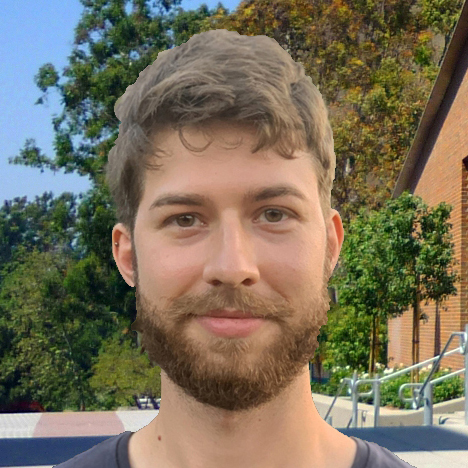 was born in Barcelona in 1996. In 2021, he received his B.Sc. degree in Aerospace Engineering from Universitat Politècnica de Catalunya (UPC). In 2014, he received the Young Researcher Award from the Catalan Government for his work on a non-satellite geo-positioning system inspired in how homing pigeons orient themselves. In 2016, he co-founded Cosmic Research, a student research team which designs solid rocket motors and sounding rockets for peaceful purposes. During the three years that he was leading the team’s engineering efforts, Cosmic Research successfully designed and tested 1 kN and 10 kN solid rocket motors built from scratch, the latter being the most powerful of its kind made by students in Europe.
was born in Barcelona in 1996. In 2021, he received his B.Sc. degree in Aerospace Engineering from Universitat Politècnica de Catalunya (UPC). In 2014, he received the Young Researcher Award from the Catalan Government for his work on a non-satellite geo-positioning system inspired in how homing pigeons orient themselves. In 2016, he co-founded Cosmic Research, a student research team which designs solid rocket motors and sounding rockets for peaceful purposes. During the three years that he was leading the team’s engineering efforts, Cosmic Research successfully designed and tested 1 kN and 10 kN solid rocket motors built from scratch, the latter being the most powerful of its kind made by students in Europe.
In 2019, he carried out an internship at the European Space Agency (ESA) in the Electric Propulsion Section in the Netherlands, focusing on Hall and ion thrusters. In 2020, he carried out an internship at the Japan Aerospace Exploration Agency (JAXA) in Sagamihara, Japan. Under the supervision of Dr. Yuichi Tsuda, manager of Hayabusa 2 mission, he developed a preliminary mission design tool to narrow down candidate Small Solar System Bodies for future missions.
In 2021, Manel was awarded the Balsells Graduate Fellowship to pursue graduate studies in Mechanical and Aerospace Engineering at University of California, Irvine (UCI). He conducts his research in electrosprays for space propulsion applications at the Electric Propulsion Lab under the supervision of Prof. Manuel Gamero-Castaño. Manel speaks Catalan, Spanish, English and basic Japanese. When he isn’t thinking about electrosprays, space engineering or Mars, which is not very often, he enjoys cooking whole-plant foods and playing the guitar.
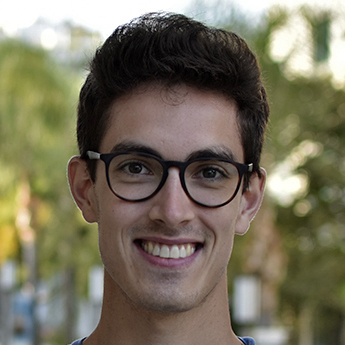 Luis García Fernández was born in Barcelona in 1998. He graduated from UPC´s Escola Superior d’Enginyeries Industrial, Aeronàutica i Audiovisual de Terrassa (ESEIAAT) in June 2020, obtaining a B.S. degree in Aerospace Engineering.
Luis García Fernández was born in Barcelona in 1998. He graduated from UPC´s Escola Superior d’Enginyeries Industrial, Aeronàutica i Audiovisual de Terrassa (ESEIAAT) in June 2020, obtaining a B.S. degree in Aerospace Engineering.
During his senior year, he did a full-time internship in the Engineering Department of Applus+ Laboratories. He worked as a Systems Engineer in the Glide Forming project, an innovative manufacturing process for carbon fiber aircraft stringers with complex contours. During his time there, he developed his Bachelor’s Thesis regarding the development of a control system for the Glide Forming Machine.
In 2021, Luis was awarded a Balsells Graduate Fellowship to pursue graduate studies in Mechanical and Aerospace Engineering at the University of California, Irvine. His main research interests include robotics and mechatronics. In his spare time, he enjoys playing sports, hiking, travelling, playing the guitar and reading.
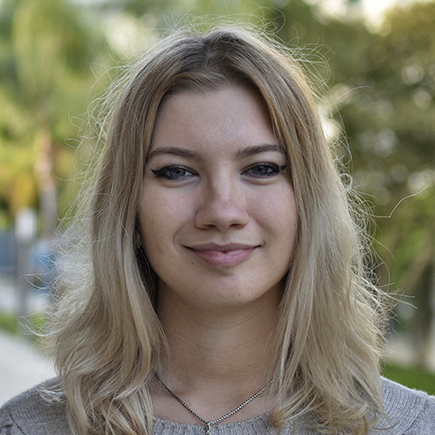 Margarita Geleta was born in Ukraine in 1999. In 2021, she received her B.S. degree in Data Science and Engineering from Universitat Politècnica de Catalunya (UPC).
Margarita Geleta was born in Ukraine in 1999. In 2021, she received her B.S. degree in Data Science and Engineering from Universitat Politècnica de Catalunya (UPC).
During her Bachelor studies, Margarita has been an active member in the Barcelona School of Informatics (FIB) governance: she has been elected by the student body as the student representative at the Standing Committee (2018-2021), at the School Board (2018-2021) and at the Academic Committee of the Data Science and Engineering Degree (2017-2019). She has also engaged in many student organizations and activities: Margarita led brand redesign in a 30-person team for HackUPC 2019, Spain’s largest student hackathon with 700 attendees; represented Catalan Junior Entrepreneurship (JE) movement by presiding the Junior Enterprise JEDI, organizing diverse courses and workshops on Tech topics and arranging collaborations with other JE organizations at the National, European and Global levels. In 2018, Margarita co-founded the FIB Visiona association, in charge of connecting UPC students with edge-cutting Tech companies. She organized 3 career fairs at the school with more than 200 attendees in each. With the raised funds, in 2020, she donated €7,500 in scholarships for FIB students and approved to donate €12,000 on even more scholarships for the AY 21/22, helping the ones in need during the coronavirus and post-pandemic crises. The same year, she was nominated for the Dona TIC Award (2nd place), as a recognition for her contributions to the STEM world of new technologies and as a role model to young women.
Margarita has led pioneering research on multimodal audio steganography with deep learning at the Image Processing Group (UPC), under the mentorship of Dr. Xavier Giró-i-Nieto (UPC), Dr. Cristian Canton (Facebook) and Dr. Kevin McGuiness (Dublin City University). In 2021, Margarita interned at Stanford University (Bustamante Lab) where she worked on deep learning methods applied to genomics. Her Bachelor Thesis, titled Unsupervised Learning with Applications in Genomics, was supervised by Dr. Alexander Ioannidis and Dr. Daniel Mas Montserrat (Stanford) and Dr. Xavier Giró-i-Nieto (UPC).
Her passion for research encouraged her to apply to the University of California, Irvine, where she was awarded a Balsells Fellowship and a Dean’s fellowship to pursue her PhD in Computer Science under the mentorship of Professor Sergio Gago-Masague. Margarita speaks Catalan, Spanish, English and Russian fluently. She loves drawing and is very curious about genealogy.
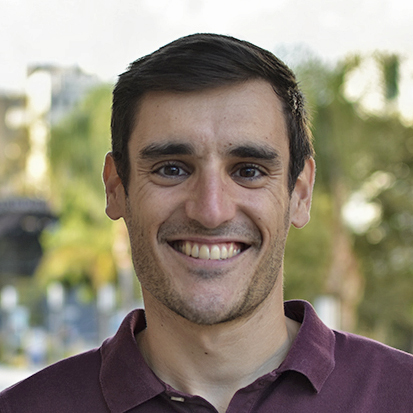 Iker Gómez Escudero was born in Rubí in 1998. In 2020, he graduated from UPC’s Escola superior d’Enginyeries Industrial, Aeronàutica i Audiovisual de Terrassa (ESEIAAT), obtaining a B.S. degree in Aerospace Engineering. After graduating, he completed the first year of the Master’s Degree in Aeronautical Engineering at ESEIAAT, as a continuation of his undergraduate studies.
Iker Gómez Escudero was born in Rubí in 1998. In 2020, he graduated from UPC’s Escola superior d’Enginyeries Industrial, Aeronàutica i Audiovisual de Terrassa (ESEIAAT), obtaining a B.S. degree in Aerospace Engineering. After graduating, he completed the first year of the Master’s Degree in Aeronautical Engineering at ESEIAAT, as a continuation of his undergraduate studies.
In 2021, Iker was awarded a Balsells Graduate Fellowship to pursue his graduate studies in Mechanical and Aerospace Engineering at the University of California, Irvine. Together with the graduate studies at ESEIAAT, he is pursuing a double master’s degree program and a PhD.
His main research interests focuses on combustion and propulsion, fluid dynamics, as well as design and testing of structures, mechanisms and systems.
Iker enjoys travelling, cooking and practicing sports, especially track and field.
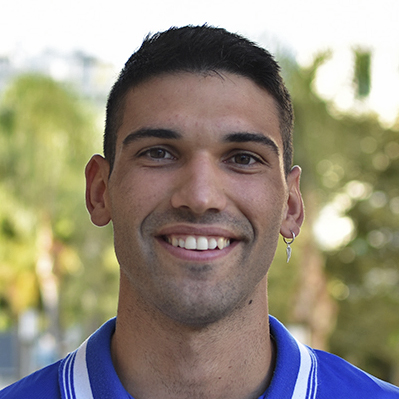 Dídac Gómez i Castellví was born in Tarragona in 1999. In 2017, he started his B.S. degree in Chemical Engineering at the Higher Technical School of Engineering at Universitat Rovira i Virgili (URV). In 2018, he was awarded an athletic scholarship at Eastern Nazarene College (ENC), Boston, Massachusetts, to obtain his Bachelor of Science in Chemistry, with a minor in Engineering. In 2020, he was awarded a certificate in Economics and International Business at Berlin, Germany’s International Business Management Institute. In 2021, he graduated with honors, and he was awarded Cum Laude, Chi Alpha Sigma, Excellence Award in Academics, and Outstanding Senior in Chemistry, among others. In addition, he won the National Collegiate Athletic Association conference (NCAA), and he was selected to be part of the National College Athlete Honor Society.
Dídac Gómez i Castellví was born in Tarragona in 1999. In 2017, he started his B.S. degree in Chemical Engineering at the Higher Technical School of Engineering at Universitat Rovira i Virgili (URV). In 2018, he was awarded an athletic scholarship at Eastern Nazarene College (ENC), Boston, Massachusetts, to obtain his Bachelor of Science in Chemistry, with a minor in Engineering. In 2020, he was awarded a certificate in Economics and International Business at Berlin, Germany’s International Business Management Institute. In 2021, he graduated with honors, and he was awarded Cum Laude, Chi Alpha Sigma, Excellence Award in Academics, and Outstanding Senior in Chemistry, among others. In addition, he won the National Collegiate Athletic Association conference (NCAA), and he was selected to be part of the National College Athlete Honor Society.
During his freshman year at URV, he competed in the Chem-E-Car competition, in which he successfully designed and built a toy car whose source of power was a magnesium-copper galvanic cell. The international company Dow Chemical Company awarded him the best team in the Chem-E-Car competition. For his senior thesis in chemistry, he investigated the electrolyte and electrode preparation on optimizing aqueous Mg-Cu batteries to research the replacement of the worldwide batteries of Lithium-Ion. In addition, he performed research in perovskite nanoparticles to participate in halide exchange reactions to catalyze Finkelstein organohalide substitution reactions and calorimetrically monitor the procedure.
In 2021, Dídac was awarded a Balsells Graduate Fellowship to pursue graduate studies in Chemical and Biomolecular Engineering at the University of California, Irvine, under Prof. Gorodetsky’s supervision. His main research interest is the electrochemical field, focused on the industry.
In his spare time, Dídac loves traveling, practicing outdoor sports, singing, and dancing.
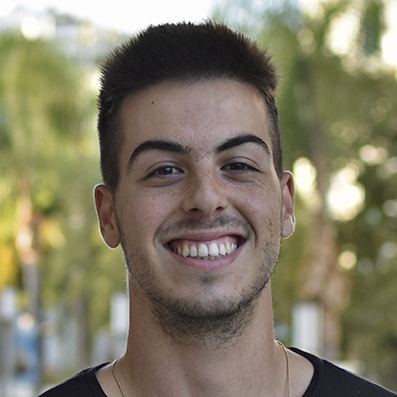 Carlos Mora Sardiña was born in Mollet del Vallès (Barcelona) in 1998. In 2020, he graduated from UPC’s Escola Superior d’Enginyeries Industrial, Aeronàutica i Audiovisual de Terrassa (ESEIAAT), obtaining a B.S. degree in Aerospace Engineering. During part of his studies, he worked as a systems engineer on projects related to testing services for the world’s leading aircraft manufacturers. Moreover, Carlos obtained his private pilot license in his junior year, allowing him to fly a variety of light aircraft. In his senior year, Carlos conducted his undergraduate thesis at the University of Rome La Sapienza, where he studied and implemented trajectory tracking algorithms for UAV.
Carlos Mora Sardiña was born in Mollet del Vallès (Barcelona) in 1998. In 2020, he graduated from UPC’s Escola Superior d’Enginyeries Industrial, Aeronàutica i Audiovisual de Terrassa (ESEIAAT), obtaining a B.S. degree in Aerospace Engineering. During part of his studies, he worked as a systems engineer on projects related to testing services for the world’s leading aircraft manufacturers. Moreover, Carlos obtained his private pilot license in his junior year, allowing him to fly a variety of light aircraft. In his senior year, Carlos conducted his undergraduate thesis at the University of Rome La Sapienza, where he studied and implemented trajectory tracking algorithms for UAV.
In 2021, he was awarded a Balsells Graduate Fellowship to pursue graduate studies in Mechanical and Aerospace Engineering at the University of California, Irvine.
Carlos is passionate about sports, especially basketball, a sport that he has practiced throughout his life. In his spare time, he also likes to read and play the guitar.
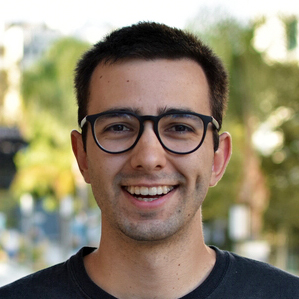 Tomàs Ortega Sanchez-Colomer was born in Sant Cugat del Vallès (Barcelona) in 1997. In 2015, he was admitted into the CFIS program at the Universitat Politècnica de Catalunya (UPC). This allowed him to obtain two bachelor’s degrees by 2020, in Mathematics and Telecommunications Engineering. During his studies he collaborated with Hewlett-Packard on the design of an ultrasound positioning system for mobile printers.
Tomàs Ortega Sanchez-Colomer was born in Sant Cugat del Vallès (Barcelona) in 1997. In 2015, he was admitted into the CFIS program at the Universitat Politècnica de Catalunya (UPC). This allowed him to obtain two bachelor’s degrees by 2020, in Mathematics and Telecommunications Engineering. During his studies he collaborated with Hewlett-Packard on the design of an ultrasound positioning system for mobile printers.
For his bachelor’s thesis, he conducted a 6-month internship at NASA’s Jet Propulsion Laboratory at Pasadena. There, he worked on the development and implementation of an adaptive-sweep algorithm for carrier acquisition and tracking in spacecraft radios. He coauthored two conference papers on this topic with Marc Sanchez Net, Kar-Ming Cheung and Dariush Divsalar.
In 2020, he joined UPC’s Signal Theory and Communications Department as a research assistant, coauthoring a journal paper on the design and optimization of 5G coverage estimators in urban scenarios with Olga Muñoz and Antonio Pascual Iserte.
During the same year, he received a master’s degree in Mathematics from UPC, with a focus on Discrete Mathematics and Information Theory. His master’s thesis on Low Density Parity Check (LDPC) codes was directed by Professor Simeon Ball.
In 2021, he was awarded a Balsells Fellowship to pursue a PhD in Electrical Engineering and Computer Sciences (EECS) at the University of California, Irvine. His research, under the supervision of Professor Hamid Jafarkhani, is focused on analyzing distributed machine learning systems in networks under different conditions, e.g., quantization, delays, noise.
In his free time, Tomàs enjoys playing team sports, climbing and going to see stand-up comedy shows.
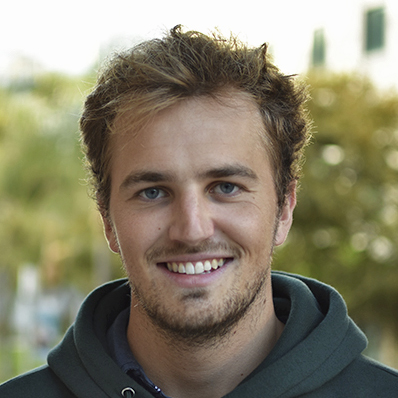 Eudald Sangenís Rafart was born in Girona in 1998. In June 2020, he received his Bachelor’s degree in Industrial Electronics and Automatic Control Engineering from the Escola d’Enginyeria Barcelona Est (EEBE-UPC). Throughout his sophomore and junior years, he took part in PUCRA (Polytechnic University of Catalonia Robotics Association) where he developed his interest in robotics.
Eudald Sangenís Rafart was born in Girona in 1998. In June 2020, he received his Bachelor’s degree in Industrial Electronics and Automatic Control Engineering from the Escola d’Enginyeria Barcelona Est (EEBE-UPC). Throughout his sophomore and junior years, he took part in PUCRA (Polytechnic University of Catalonia Robotics Association) where he developed his interest in robotics.
During the last semester of his senior year (2019), he was awarded a Balsells Mobility Fellowship to conduct his Bachelor’s thesis at the University of Colorado at Colorado Springs. He joined the group of Professor Leslie Tekamp at the department of Electrical and Computer Engineering to develop a Wi-Fi remote-controlled car commanded by a C# application.
In 2021, Eudald was awarded a Balsells Graduate Fellowship to pursue graduate studies in Mechanical and Aerospace Engineering at the University of California, Irvine. His main research interests are micro-electromechanical systems applied to robotics.
In his spare time, Eudald enjoys practicing sports like water polo, tennis and, skiing. As well as other activities like cooking and traveling.
